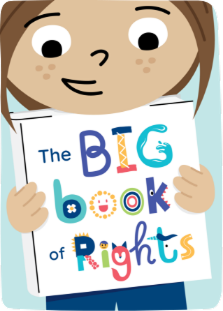Unlocking Every Child's Right to Thrive: Article 24

The United Nations Convention on the Rights of the Child (UNCRC) is a landmark international agreement that grants all children a comprehensive set of rights. Among these, Article 24 stands out as a critical provision that guarantees every child's right to the highest attainable standard of health. In 2024, the theme "Children have the right to a clean and safe environment" underscores the importance of environmental health in ensuring children's overall well-being. This year also marks the United Nations International Year of Families with a focus on climate change, highlighting the role of families in climate action.
Health on all levels
Holistic health is a comprehensive approach that considers physical, mental, and social well-being as interconnected and essential for overall health. For children, achieving holistic health means not only being free from illness but also living in an environment that supports their physical, emotional, and social development. The seven dimensions of wellness—physical, emotional, intellectual, social, spiritual, environmental, and occupational—highlight the multifaceted nature of health and the need for a balanced approach to well-being. A clean and safe environment is fundamental to holistic health. It ensures that children have access to clean air, safe drinking water, nutritious food, and secure housing, all of which are crucial for their physical health. Additionally, a healthy environment supports mental and social well-being by providing safe spaces for play, learning, and social interaction.
How does the UNHCR define health in Article 24?
Article 24 of the UNCRC explicitly recognises the right of the child to the enjoyment of the highest attainable standard of health and access to facilities for the treatment of illness and rehabilitation. This article places a clear obligation on States Parties to ensure that no child is deprived of their right to health care services.
Key provisions of Article 24 include:
Diminishing infant and child mortality: States must take measures to reduce the rates of infant and child deaths.
Ensuring necessary medical assistance and health care: Emphasis is placed on the development of primary health care systems.
Combating disease and malnutrition: This includes providing adequate nutritious foods and clean drinking water, considering the dangers of environmental pollution.
Ensuring appropriate pre-natal and post-natal health care for mothers: This is crucial for the health of both mothers and their children.
Providing education on child health and nutrition: Parents and children must be informed and supported in using basic knowledge of health, nutrition, hygiene, and environmental sanitation.
Focus on a Clean and Safe Environment
A clean and safe environment is essential for children's health and well-being. Environmental factors such as air quality, water safety, and housing conditions have a direct impact on children's physical health. For instance, exposure to pollution can lead to respiratory issues, while access to clean water is vital for preventing waterborne diseases (UNCRC Article 24). The interdependence of environmental health with other rights is evident. The right to adequate food and nutrition, clean water and sanitation, and safe housing are all interconnected and contribute to a child's overall health. Ensuring a clean and safe environment means addressing these factors comprehensively to support children's physical, mental, and social well-being (UNCRC Article 24).
Interdependence with Other Rights
The right to health is closely linked with other fundamental rights. For example:
Right to adequate food and nutrition: Proper nutrition is essential for growth and development, and it directly impacts a child's health.
Right to clean water and sanitation: Access to clean water and proper sanitation facilities is crucial for preventing diseases and maintaining health.
Right to safe and adequate housing: Safe housing protects children from environmental hazards and provides a stable environment for their development.
Right to education: Education plays a significant role in promoting health by providing knowledge and skills for healthy living.
A holistic approach to children's rights recognises that these rights are interdependent and must be addressed together to ensure the overall well-being of children (UNCRC Article 24).
Practical Implications for Educators and Stakeholders
Educators at all levels play a vital role in promoting a clean and safe environment for children. They can integrate health education into their programs, teaching children about hygiene, nutrition, and environmental stewardship. Collaboration with parents, communities, and policymakers is essential to create supportive environments that prioritise children's health (Children's Rights Queensland).
Successful initiatives and programs that promote children's health and well-being often involve a multi-faceted approach. For example, schools partnering with organisations to provide nutritious meals and health education can significantly improve children's health outcomes. Educators can advocate for such programs and work towards creating environments that support holistic health (UNCRC Article 24).
Youth Activism and Climate Action
Young people around the world are taking significant steps to address climate change. Figures like Greta Thunberg have inspired millions to join the movement for climate action. Youth-led initiatives, such as the Fridays for Future strikes, highlight the critical role of young people in advocating for environmental justice (UNICEF).However, the responsibility for meaningful climate action lies with adults, lawmakers, and policymakers. It is crucial for these stakeholders to create and enforce policies that address the impacts of climate change and protect children's rights. Empowering families through education, changing consumption habits, and advocacy is critical for meaningful and effective climate action (UN International Year of Families).
Article 24 of the UNCRC is a powerful affirmation of every child's right to the highest attainable standard of health. The 2024 theme, "Children have the right to a clean and safe environment," highlights the critical role of environmental health in ensuring children's well-being. Early childhood educators, schools, and stakeholders have a responsibility to advocate for and implement practices that support a clean and safe environment for children. By doing so, we can unlock every child's right to thrive and ensure a healthier, brighter future for all. Let us continue to learn, advocate, and take action to uphold the rights of children and create environments where they can grow and flourish.
References
BBC. (2019). Greta Thunberg: Who is she and what does she want?
Children's Rights Queensland. (n.d.). Home. Retrieved from Children's Rights Queensland
Office of the Public Guardian. (n.d.). My rights. Retrieved from Office of the Public Guardian
Queensland Family and Child Commission. (n.d.). Child Rights. Retrieved from QFCC Child Rights
UNHCR. (n.d.). Child and Youth Protection. Retrieved from UNHCR Child and Youth Protection
UNICEF. (n.d.). Young climate activists demand action, inspire hope
United Nations Convention on the Rights of the Child (UNCRC). (1989). Article 24. Retrieved from UNCRC Article 24
United Nations. (2024). International Year of Families
Western Connecticut State University. (n.d.). What is Holistic Health?


-1.jpg?width=352&name=CRQ%20-%20CW%20LAUNCH%20(1)-1.jpg)


.jpg)


.png)